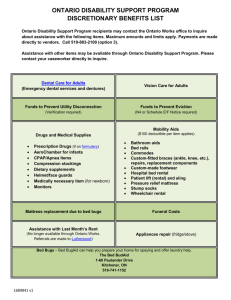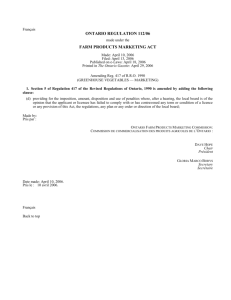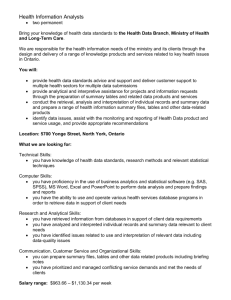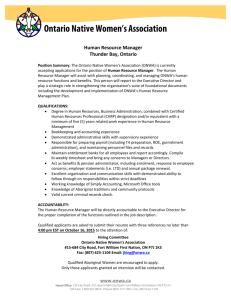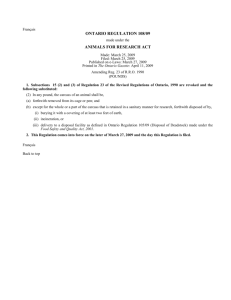How to Start a Bed and Breakfast in Ontario
advertisement
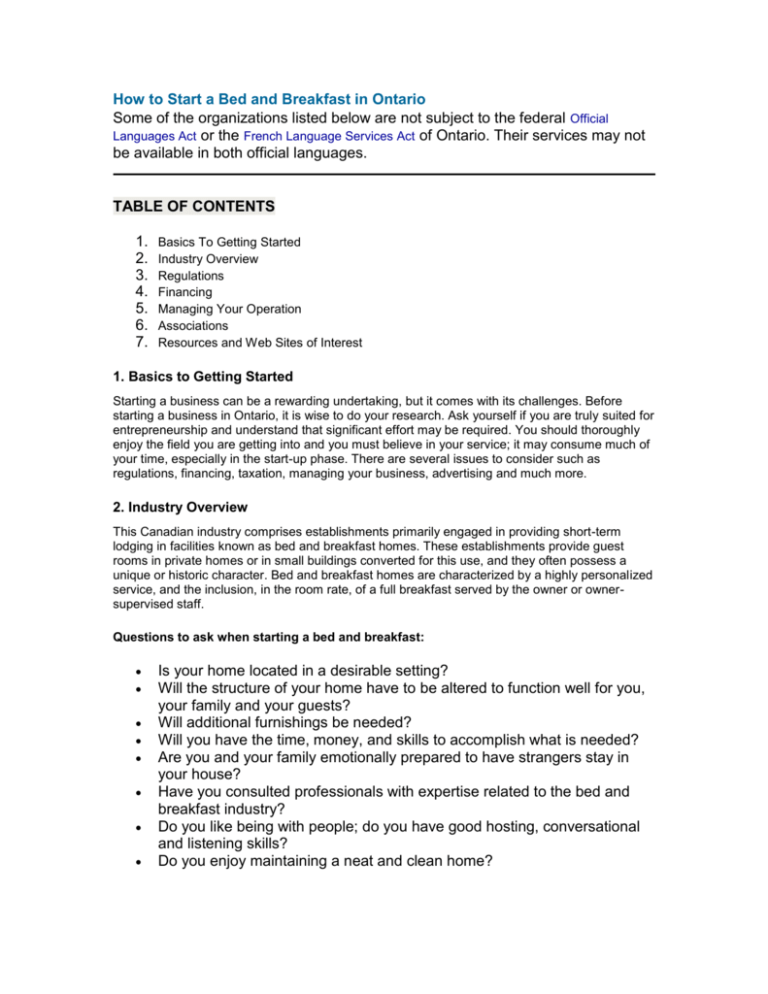
How to Start a Bed and Breakfast in Ontario Some of the organizations listed below are not subject to the federal Official Languages Act or the French Language Services Act of Ontario. Their services may not be available in both official languages. TABLE OF CONTENTS 1. 2. 3. 4. 5. 6. 7. Basics To Getting Started Industry Overview Regulations Financing Managing Your Operation Associations Resources and Web Sites of Interest 1. Basics to Getting Started Starting a business can be a rewarding undertaking, but it comes with its challenges. Before starting a business in Ontario, it is wise to do your research. Ask yourself if you are truly suited for entrepreneurship and understand that significant effort may be required. You should thoroughly enjoy the field you are getting into and you must believe in your service; it may consume much of your time, especially in the start-up phase. There are several issues to consider such as regulations, financing, taxation, managing your business, advertising and much more. 2. Industry Overview This Canadian industry comprises establishments primarily engaged in providing short-term lodging in facilities known as bed and breakfast homes. These establishments provide guest rooms in private homes or in small buildings converted for this use, and they often possess a unique or historic character. Bed and breakfast homes are characterized by a highly personalized service, and the inclusion, in the room rate, of a full breakfast served by the owner or ownersupervised staff. Questions to ask when starting a bed and breakfast: Is your home located in a desirable setting? Will the structure of your home have to be altered to function well for you, your family and your guests? Will additional furnishings be needed? Will you have the time, money, and skills to accomplish what is needed? Are you and your family emotionally prepared to have strangers stay in your house? Have you consulted professionals with expertise related to the bed and breakfast industry? Do you like being with people; do you have good hosting, conversational and listening skills? Do you enjoy maintaining a neat and clean home? Are you well-organized (for example, to maintain reservation schedules and prepare breakfast) and do you understand the basics of managing, accounting and bookkeeping? Have you done your research (i.e. analyzed the demand for your services; identified your competitors and established what will set you apart from them; determined how you will advertise)? Do you have realistic expectations? (Do not expect big profits...these are not get-rich-quick operations.) Source: Running your own bed and breakfast guide; Elizabeth Gundrey; 1989 Accommodations Rating Services An Accommodations Rating Program is defined as "the rating of like accommodations based on the basics of cleanliness, comfort and safety, as well as the extent and quality of facilities and amenities." Participating properties are inspected and rated to ensure they meet consumer expectations. Ratings are based on extent and quality of facilities, services and amenities. The higher the star rating, the more extensive are the facilities, guest services and amenities. (Note: The majority of lodging properties are in the 2 to 3 star range; there are only a handful of 5-star properties in all of Canada.) If you wish to have your establishment rated, contact your local bed and breakfast association for a listing of Canadian companies who offer this service in your province. Planning Your Business What is a Business Plan? A business plan is a recognized management tool used by successful and/or prospective businesses of all sizes to document business objectives and to propose how these objectives will be attained within a specific period of time. It is a written document, which describes who you are, what you plan to achieve, where your business will be located, when you expect to get under way, and how you will overcome the risks involved and provide the returns anticipated. Why Do I Need One? A business plan will provide information of your proposed venture to lenders, investors, and suppliers to demonstrate how you plan to use their money, and to establish a basis for credibility of your project. This plan will serve as a guide to the various areas that you as a manager will be concerned with. As you work through this plan, adapt it to your own particular needs. 3. Regulations Examples of licenses, permits and regulations that could apply to you when starting your bed and breakfast may include, but are not limited to: Canadian Food Inspection Agency (CFIA) The Canadian Food Inspection Agency contains a lot of information on food safety, including food safety tips. For further information: please call 1-800-442-2342 or (613) 225-2342 visit the web site: Canadian Food Inspection Agency Ontario Ministry of Agriculture, Food and Rural Affairs (OMAFRA) The Ministry of Agriculture, Food and Rural Affairs web site contains a lot of information on food safety, including information on the Food Safety and Quality Act . For further information: please call 1-888-466-2372 visit the web site: Food Safety Research Program Ontario Ministry of Health and Long-Term Care (MOHLTC) The Ministry of Health and Long-Term Care web site contains a lot of information on Health Issues, including locations of Public Health Units and publications on food and water safety. For further information: please call (416) 314-5518 or 1-800-268-1154 visit the web site: Publications: Food Safety The Smoke-Free Ontario Act As of May 31, 2006, the Ontario government is prohibiting smoking in all enclosed workplaces and enclosed public places. The legislation will also strengthen measures to ensure only those 19 years of age and older can buy cigarettes and will phase out the display of tobacco products, with a complete ban beginning May 31, 2008. For further information: please call 416-326-4846 visit these web sites: Ministry of Health Promotion Smoke-Free Ontario Act Building and Fire Codes Ontario Building Code and Municipal Building Department A business location is subject to inspection by the Municipal Building Department to make sure that it meets local safety requirements, such as those designated by the Ontario Building Code and the Ontario Fire Code. Most municipalities require a building permit before alterations or new construction begins. It is extremely important, therefore, that you check zoning regulations before signing a lease, and obtain the necessary building permit(s) before beginning alterations or new construction. For further information: visit the web site: Hotel Fire Safety Requirements Municipal Requirements One area of rules and regulations that all businesses must comply with is that of licenses, permits and regulations. When creating a company, the entrepreneur must contact the municipality that the business will be located in. Each municipal government has the authority to issue its own business licenses within its jurisdiction. Since there is no uniformity throughout the country regarding municipal licenses for businesses, you should consult with the appropriate local officials to determine whether your business will be affected by local regulations and licensing requirements. Businesses (including home-based businesses) must also meet the zoning by-laws that control property uses in their municipalities. For further information: visit the web site: Association Municipalities of Ontario see the document ARCHIVE - Municipal Requirements to Start a Business Music License Performances of music in public, i.e. offices, stores, etc., require a licence. This licence is necessary whether the music is performed by live or recorded means. For further information: please call (416) 445-8700 or 1-800-557-6226 visit the web site: Society of Composers, Authors and Music Publishers of Canada (SOCAN) Additional Regulations and Acts Tourism Act Travel Industry Act Health Protection and Promotion Act Smoke-Free Ontario Act Loi sur les aliments et drogues 4. Financing The Canada-Ontario Business Service Centre has created documents, which provide an overview of some of the main financing options for individuals starting and operating a business in Ontario, including programs offered or supported by the government For further information: please call: 1-800-567-2345 visit the web site: Canada-Ontario Business Service Centre see these documents: Financing for Starting a Business Info-Guide Financing for Established Businesses Info-Guide Business Guides Canada Small Business Financing Program Business Financing Program can assist new and existing small businesses with annual gross revenues not exceeding $5 million (excluding farming and charitable or religious enterprises) in obtaining term loans and capital leases of up to $250 000 to help finance fixed asset needs. For further information : please call (613) 954-5540 visit the web site: Canadian Small Business Financing Program see the document: Canada Small Business Financing (CSBF) Program Sources of Financing Sources of Financing is an Internet resource for locating traditional and alternative sources of small business financing. This site provides interactive access to objective information on appropriate forms of public and private sector sources of debt and equity financing: For further information: visit the web site: Sources of Financing see the document: Sources of Financing Sources of Micro-Credit Financing "Micro-credit" can be defined as small loans made to individuals to undertake self-employment or to start small businesses. This type of financing may be provided through a number of different sources including independent non-profit organizations, community economic development programs, commercial financial institutions, etc. For further information: please call 1-800-567-2345 or (416) 775-3456 visit the web site: Sources of Financing: Micro-Credit see the document: Sources of Micro-credit Financing 5. Managing Your Operation Dealing with Business Taxes All businesses must be aware of the various taxes that may apply to their product or service. Depending on the type and location of products or services being offered, federal, provincial and/or municipal business taxes may apply. For further information: see the document: Taxation Info-Guide visit these web sites: Small Business Pointers Ontario Retail Sales Tax - Hospitality Guides Provincial Tax Forms and Publications Small Business Tax Help Canada Revenue Agency - Topics for businesses Income Tax Information Business owners must be aware of the requirements of Income tax that may apply to their product or service. There are different tax implications for incorporated and non-incorporated businesses. For information specific to your organization you should consult an accountant or financial professional. For further information: please call: 1-800-959-5525 visit these web sites: Ontario Income Tax Ontario Corporations Tax see the document: Taxation Info-Guide Below are links to publications that cover some of the general tax requirements for business owners in Ontario. Small Business Guide This booklet will guide you through various aspects of Retail Sales Tax, Corporations Tax and Employer Health Tax. This booklet also answers some of the frequently asked questions of small business owners regarding tax obligations. EHT Guide for Employers Describes the main features of the EHT, including taxpayer rights and responsibilities under the Employer Health Tax Act. For further information: see the document Employer Health Tax - EHT Retention/Destruction of Books and Records Explains the retention period required for Ontario tax purposes, before books and records can be destroyed. Voluntary Disclosure Explains what voluntary compliance is and the basic principles under which Ontario's tax system operates. Insurance Insurance needs for businesses vary greatly. It is best to choose an insurance agent or broker familiar with your size of business and, in particular, an agent familiar with your type of operation. If you don't have an insurance agent, you may wish to ask other business owners in your area to recommend one. The following list is included to remind you not to overlook the complex areas of business insurance. It is best, however, to discuss your specific requirements with your insurance agent. Basic insurance: fire insurance (extended coverage on buildings and contents); liability insurance (depending on the type of business); burglary protection (theft coverage); dishonesty insurance (covers thefts by employees). Marketing/Advertising Whether you have a small bed and breakfast or a large one, you must tell people who you are, where you are located and how to contact you. Some methods of advertising include placing ads in local newspapers, on radio, sending out direct mail pieces and brochures and including your business information with any local tourism initiatives in your region. Outdoor signage and word of mouth can also be effective means of advertisement. For further information: see these documents: Ways to Promote Your Product or Service Do You Know the Results of Your Advertising Advertising Do's and Don'ts Signage The Tourism-Oriented Directional Signing (TODS) program is administered by Canadian TODS Limited, a private company, under the supervision of the Ministry of Economic Development and Trade - MEDT and the Ministry of Transportation of Ontario - MTO. TODS are a new type of sign, to be placed on Ontario's provincial highways. If you are an eligible tourism operation and sign space exists, you can apply for a sign bearing your operation's name, a generic symbol (or in some cases your corporate logo) and directional information. The signs are directional rather than for advertising. The Logo Sign System is separate from TODS. This system pertains to signage for motorist services near highways. These signs would have symbols for overnight accommodation, service stations and restaurants. For further information: please call (905) 851-1322 (Woodbridge) or 1-888-263-9333 Ext. 101 Selecting Professional Services The use of professional services is essential to the success of a small business. Professionals can provide knowledge and expertise in the areas where you may have little. They can round out your management team to ensure your business is operating efficiently. For further information: see the document Selecting Professional Services As an entrepreneur, there are four main areas of professional services with which you may consult: lawyer (contact a lawyer about legal issues); insurance broker; accountant; banker (for tips and pointers on dealing with your bank, see the document Dealing With Your Banker & Other Lenders ). Basic Bookkeeping A good record keeping system should be simple to use, easy to understand, reliable, accurate, consistent and designed to provide information on a timely basis. Note: All staff working with cash should be trained to recognize counterfeit currency. The legal requirement concerning financial records specify only that there be a permanent, accurate and complete record of your daily income and expenses. There are many types of record books and bookkeeping systems available. For example: double entry bookkeeping; commercial bookkeeping systems; one-write systems; computerized systems; single entry bookkeeping. For further information: see the document Basic Bookkeeping Setting Up a Pay System Pay administration is a management tool that enables you to control personnel cost, increase employee morale and reduce work force turnover. For further information: see the document Setting Up a Pay System Setting the Right Price Setting the right price is important in ensuring the success of your business. In the end, the right price for the service is the price that the consumer is willing to pay. Correct pricing decisions are key to successful business management. For further information: see the document Setting the Right Price Employing people What are the rules on working conditions in Ontario? The Employment Standards Branch of the Ontario Ministry of Labour is responsible for the administration and enforcement of the Employment Standards Act, which provides for minimum terms and conditions of employment in most industries. For further information: please call (416) 326-7160 or 1-800-531-5551 visit these web sites: What You Should Know About The Ontario Employment Standards Act Employment Standards Claim Employee Self Help Kit see the documents: Employment Regulations Info-Guide Employment and Training Assistance Programs Info-Guide Employee or Self-Employed? Choosing Your Location Choosing the right location for your business is important. A location will depend on the needs of your business, where your customers and competitors are, and such things as taxes, zoning restrictions, noise and the environment. For most businesses, an appropriate location is critical. For further information: see the document Store Location - "Little Things" Mean a Lot Furnishings and Equipment When furnishing a bed and breakfast, here are some items to consider: Bedrooms Each guest room should have a double, queen or twin bed(s), bedside tables, dresser or writing table or combination, mirror, easy chair(s), desk chair, bedside rug, window screens and coverings, closet, smoke detector, wastebasket, a clock radio, hangers, locking door and a posted rate card; invest in good quality mattresses; and consider extras such as a full-length mirror, luggage racks, writing materials, newspapers, brochures describing local attractions or a listing of local restaurants. Linen Have at least three changes of linens, particularly if you send laundry out; and use new bedspreads, throw blankets, blankets, sheets, pillow cases and allergy-free pillows. Bathrooms for each person, provide a bath towel, hand towel, face cloth, wrapped soaps and drinking glass (paper cups in shared bathrooms) ; install towel racks and good lighting near bathroom mirror; remove or lock away all personal belongings, medicines, cleaning solutions, toxic or hazardous substances; and put a name plate on the outside of a locking door. Lighting Install wall outlets and lights near beds, mirrors, desks and chairs. Pay attention to the importance of lighting - diffuse light evenly through the room, avoid harsh overhead lighting and provide reading light on each side of a double bed. Flooring Ensure floors can withstand traffic; use penetrating seals on wood floors and opt for inlaid instead of printed vinyl; use rug underlay to prevent skidding; and choose thick and heavy scatter mats so that they lie flat. There will be certain equipment and furniture you will need in your place of business which will allow you to perform your services. It is suggested to make a list of the required equipment and its cost to you. An important factor to consider, when choosing equipment, is the after-sales service and repair, and their affordability. Leasing Equipment - An alternative is to lease equipment to help keep start-up costs down. To obtain financing for capital leasing for new or used equipment for the creation of your business, see the document Capital Leasing Pilot Project. For further information: see the document Business Plan for Small Service Firms Cost Control You must have procedures for controlling inventory and costs. Ask people in your industry for information about procedures for: Purchasing - Most of the time, purchasing is done over the telephone, by fax or online. Often no contract is signed between the purchaser and the supplier; it is essential that you choose your supplier carefully. Receiving - Check all deliveries against the Purchasing and Receiving Form, in three ways: quantity, price and quality. Make sure specifications are met. Careful recording will show short shipments, price variations and weight differences. Budgeting and Projecting - Establish a cash budget and maintain cash flow projections on a continual basis. Storage - Ensure refrigerated and frozen products are quickly placed in a cold storage. Storage temperature for dry goods (between 10-21oC) and frozen goods (-18oC or less). Rotate your stock to ensure that oldest items are used first before the new stock. Making a profit is the most important -- some might say the only objective of a business. Profit measures success. It can be defined simply: revenues - expenses = profit. So, to increase profits you must raise revenues, lower expenses or both. To make improvements you must know what's really going on financially at all times. For further information: see the document Checklist for Profit Watching Personal Information Protection and Electronic Documents Act The Personal Information Protection and Electronic Documents (PIPED) Act sets out ground rules for how private sector organizations may collect, use or disclose personal information in the course of commercial activities.As of January 1, 2002, the personal health information collected, used or disclosed by these organizations is also covered. For further information: please call 1-800-282-1376 visit the web site: PIPEDA Guide for Businesses and Organizations see the document Protection of Personal Information - Your Responsibilities 6. Associations Although it is not necessary to join a bed and breakfast association, there can be advantages in becoming a member in these industry associations. In general, bed and breakfast associations will: promote bed and breakfasts as an accommodation choice; promote and exchange marketing and promotional ideas among members; promote and encourage cooperation on vacancy referrals among members; establish and encourage high standards of quality and professionalism; represent and advocate on behalf of members. For further information: visit the web site: Bed and Breakfast Associations Canada Select - Rating Program An Accommodations Rating Program is defined as "the rating of like accommodations based on the basics of cleanliness, comfort and safety, as well as the extent and quality of facilities and amenities."4 Participating properties are inspected and rated to ensure they meet consumer expectations. Ratings are based on extent and quality of facilities, services and amenities. The higher the star rating, the more extensive are the facilities, guest services and amenities. (Note: The majority of lodging properties are in the 2 to 3 star range; there are only a handful of 5-star properties in all of Canada.) If you wish to have your establishment rated, contact your local bed and breakfast association. For further information: visit the web site Canada Select 7. Resources and web sites of Interest Additional resources which may help bed and breakfast owners include, but are not limited to: Statistics Tourism Stats and Figures Statistics Canada Provincial and territorial statistics offices Ministry of Tourism and Recreation Ontario Tourism Current Performance Historical Trends and Statistics Travel in Ontario web sites of Interest Travel Industry Council of Ontario The Travel Industry Council of Ontario is an organization mandated by the Ontario Government to administer the Ontario Travel Industry Act which governs approximately 3,000 travel retailers and travel wholesalers registered in Ontario. Canadian Tourism Human Resource Council The Canadian Tourism Human Resource Council (CTHRC) is a national non-profit organization that promotes and enhances professionalism in the Canadian tourism industry. Canada Tourism Commission The CTC provides Canada's tourism industry with the tools and strategic information it needs to succeed. The Commission coordinates the trade relations and marketing activities of all the key players in Canada's tourism industry to help them capitalize on this country's potential as a highdemand travel destination. Ontario Tourism Marketing Partnership The OTMPC collaborates with tourism partners and colleagues at home and internationally to develop and deliver exciting, integrated, research-driven marketing programs that reinforce Ontario as a strong tourism economy and a premier, four-season travel destination. Retail Merchants Association of Canada Inc. The Retail Merchants' Association is run by retailers for retailers, and offers a broad range of programs designed to keep independent retailers strong and profitable and provides an online advertising initiative called Real-time Merchant Advertising . Association members can also be eligible for lower credit card merchant discount rates. For further information: please call (416) 293-2100 Tourism Daily News

